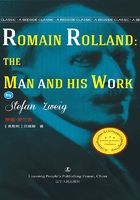
第12章 RENOWN
WE are in the year 1910. A motor is tearing along the Champs Elysées, outrunning the belated warnings of its own hooter. There is a cry, and a man who was incautiously crossing the street lies beneath the wheels. He is borne away wounded and with broken limbs, to be nursed back to life.
Nothing can better exemplify the slenderness, as yet, of Romain Rolland's fame, than the reflection how little his death at this juncture would have signified to the literary world. There would have been a paragraph or two in the newspapers informing the public that the sometime professor of musical history at the Sorbonne had succumbed after being run over by a motor. A few, perhaps, would have remembered that fifteen years earlier this man Rolland had written promising dramas, and books on musical topics. Among the innumerable inhabitants of Paris, scarce a handful would have known anything of the deceased author.Thus ignored was Romain Rolland two years before he obtained a European reputation; thus nameless was he when he had finished most of the works which were to make him a leader of our generation—the dozen or so dramas, the biographies of the heroes, and the first eight volumes of Jean Christophe.
A wonderful thing is fame, wonderful its eternal multiplicity. Every reputation has peculiar characteristics, independent of the man to whom it attaches, and yet appertaining to him as his destiny. Fame may be wise and it may be foolish; it may be deserved and it may be undeserved. On the one hand it may be easily attained and brief, flashing transiently like a meteor;on the other hand it may be tardy, slow in blossoming,following reluctantly in the footsteps of the works.Sometimes fame is malicious, ghoulish, arriving too late, and battening upon corpses.
Strange is the relationship between Rolland and fame. From early youth he was allured by its magic;but charmed by the thought of the only reputation that counts, the reputation that is based upon moral strength and ethical authority, he proudly and steadfastly renounced the ordinary amenities of cliquism and conventional intercourse. He knew the dangers and temptations of power; he knew that fussy activity could grasp nothing but a cold shadow, and was impotent to seize the radiant light. Never, therefore,did he take any deliberate step towards fame, never did he reach out his hand to fame, near to him as fame had been more than once in his life. Indeed, he deliberately repelled the oncoming footsteps by the publication of his scathing La foire sur la place, through which he permanently forfeited the favor of the Parisian press.What he writes of Jean Christophe applies perfectly to himself: "Le succès n'était pas son but; son but était la foi." [Not success, but faith was his goal.]
Fame loved Rolland, who loved fame from afar,unobtrusively. "It were pity," fame seemed to say,"to disturb this man's work. The seeds must lie for a while in the darkness, enduring patiently, until the time comes for germination." Reputation and the work were growing in two different worlds, awaiting contact. A small community of admirers had formed after the publication of Beethoven. They followed Jean Christophe in his pilgrimage. The faithful of the"Cahiers de la quinzaine" won new friends. Without any help from the press, through the unseen influence of responsive sympathies, the circulation of his works grew. Translations were published. Paul Seippel, the distinguished Swiss author, penned a comprehensive biography. Rolland had found many devoted admirers before the newspapers had begun to print his name.The crowning of his completed work by the Academy was nothing more than the sound of a trumpet summoning the armies of his admirers to a review. All at once accounts of Rolland broke upon the world like a flood, shortly before he had attained his fiftieth year In 1912 he was still unknown; in 1914 he had a wide reputation. With a cry of astonishment, a generation recognized its leader, and Europe became aware of the first product of the new universal European spirit.
There is a mystical significance in Romain Rolland's rise to fame, just as in every event of his life. Fame came late to this man whom fame had passed by during the bitter years of mental distress and material need. Nevertheless it came at the right hour, since it came before the war. Rolland's renown put a sword into his hand. At the decisive moment he had power and a voice to speak for Europe. He stood on a pedestal, so that he was visible above the medley.In truth fame was granted at a fitting time, when through suffering and knowledge Rolland had grown ripe for his highest function, to assume his European responsibility. Reputation, and the power that reputation gives, came at a moment when the world of the courageous needed a man who should proclaim against the world itself the world's eternal message of brotherhood.